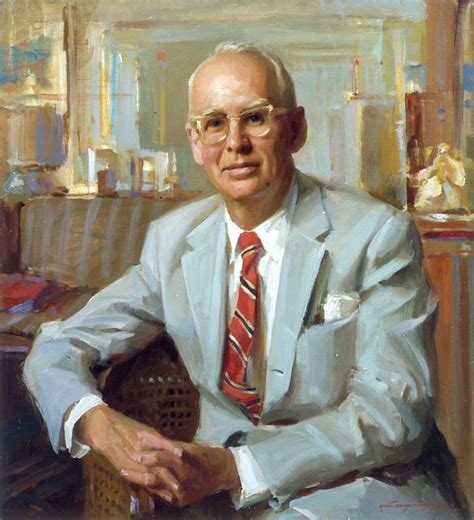A Quote by Johann Wolfgang von Goethe
Music is so elevated that it is beyond the reach of intellect and there flows from it an influence which is all-potent, and which noone can explain.
Related Quotes
And so it is with our own past. It is a labour in vain to attempt to recapture it: all the efforts of our intellect must prove futile. The past is hidden somewhere outside the realm, beyond the reach of intellect, in some material object (in the sensation which that material object will give us) of which we have no inkling. And it depends on chance whether or not we come upon this object before we ourselves must die.
In very truth, a wise imagination, which is the presence of the spirit of God, is the best guide that man or woman can have; for it is not the things we see the most clearly that influence us the most powerfully; undefined, yet vivid visions of something beyond, something which eye has not seen nor ear heard, have far more influence than any logical sequences whereby the same things may be demonstrated to the intellect. It is the nature of the thing, not the clearness of its outline, that determines its operation. We live by faith, and not by sight.
There is a power in the soul, quite separate from the intellect, which sweeps away or recognizes the marvelous, by which God is felt. Faith stands serenely far above the reach of the atheism of science. It does not rest on the wonderful, but on the eternal wisdom and goodness of God. The revelation of the Son was to proclaim a Father, not a mystery. No science can sweep away the everlasting love which the heart feels, and which the intellect does not even pretend to judge or recognize.
When I was fifteen, all I wanted was to go off to some other world, a place beyond anybody’s reach. A place beyond the flow of time.” - But there’s no place like that in this world. - Exactly. Which is why I’m living here, in this world where things are continually damaged, where the heart is fickle, where time flows past without a break.
Religion is the vision of something which stands beyond, behind, and within, the passing flux of immediate things; something which is real, and yet waiting to be realised; something which is a remote possibility, and yet the greatest of present facts; something that gives meaning to all that passes, and yet eludes apprehension; something whose possession is the final good, and yet is beyond all reach; something which is the ultimate ideal, and the hopeless quest.
I try to make art which celebrates doubt and uncertainty. Which provokes answers but doesn't give them. Which withholds absolute meaning by incorporating parasite meanings. Which suspends meaning while perpetually dispatching you toward interpretation, urging you beyond dogmatism, beyond doctrine, beyond ideology, beyond authority.
We believe that man's value - as every creature's value, ultimately - lies not in the mere intellect but in the spirit: in the capacity to reflect that which, for lack of a more precise word, we choose to call “the divine,” i.e. that which is true and beautiful beyond all manifestation, that which remains timeless (and therefore unchangeable) within all changes.
The region belonging to the pure intellect is straitened: the imagination labours to extend its territories, to give it room. She sweeps across the boarders, searching out new lands into which she may guide her plodding brother. The imagination is the light which redeems from the darkness for the eyes of the understanding. Novalis says, 'The imagination is the stuff of the intellect' -affords, that is, the material upon which the intellect works.
Clearly, unless the Lord chooses to explain Himself to us, which often He does not, His motivation and purposes are beyond the reach of mortal man. What this means in practical terms is that many of our questions - especially those that begin with the word 'why' - will have to remain unanswered for the time being.
The way in which men cling to old institutions after the life has departed out of them, and out of themselves, reminds me of those monkeys which cling by their tails - aye, whose tails contract about the limbs, even the dead limbs, of the forest, and they hang suspended beyond the hunter's reach long after they are dead. It is of no use to argue with such men. They have not an apprehensive intellect, but merely, as it were a prehensile tail.





































